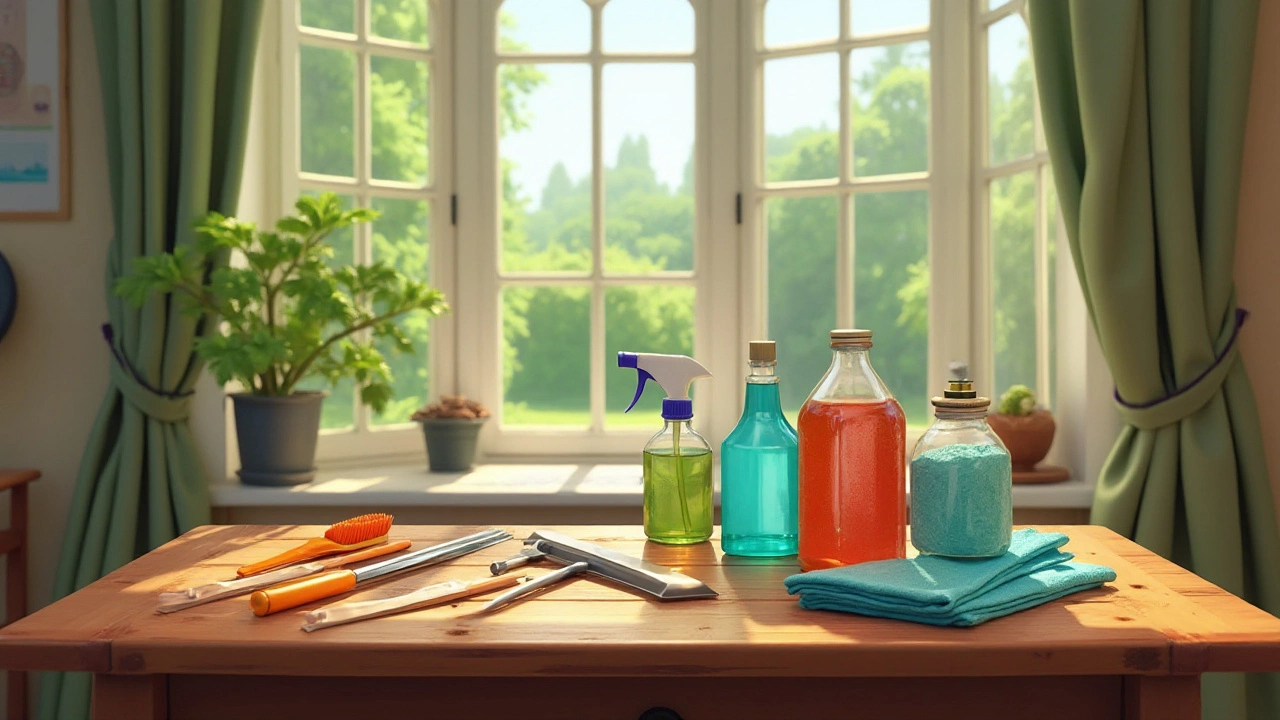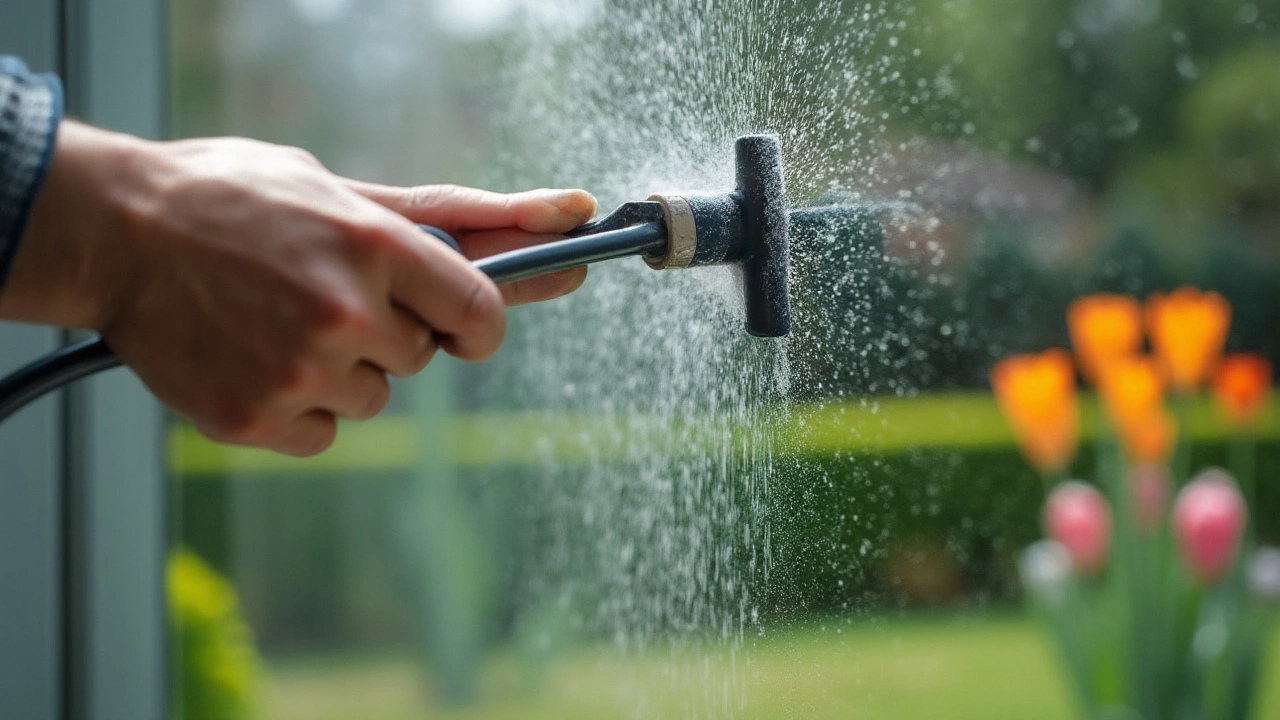When it comes to making windows sparkle, professionals often have a few tricks up their sleeves, beginning with the detergents they choose. Unlike the standard household cleaners, professional-grade solutions often blend efficiency with window-friendly formulas that minimize residue and streaks.
While commercial options dominate the market, many seasoned window cleaners mix their own solutions, striking a balance between effectiveness and cost. Knowing which detergent suits your window type can make a world of difference in the clarity and cleanliness of your view.
Dive into the world of window cleaning and discover how the right detergent—coupled with expert techniques—can revolutionize your home maintenance regime, ensuring that your windows remain as clear as the day they were installed.
- The Importance of Choosing the Right Detergent
- Exploring Commercial Window Cleaning Detergents
- Homemade Detergent Solutions and Their Effectiveness
- Specialized Detergents for Different Types of Glass
- Environmental Considerations in Window Cleaning
- Tips and Techniques for Spotless Window Cleaning
The Importance of Choosing the Right Detergent
In the realm of window cleaning, selecting the right detergent is akin to an artist choosing the perfect brush. It's the foundation upon which all successful cleaning endeavors are built. Windows, by their very nature, are meant to be transparent, allowing light to pour into our living spaces, yet they often bear the brunt of environmental dust, bird droppings, and fingerprints. Here lies the paramount importance of the detergent—its role is not merely to clean but to do so without leaving streaks, smudges, or harming the glass itself.
For professionals in the industry, the choice of detergent can affect both efficiency and effectiveness. Imagine the frustration of spending hours on window cleaning only to be left with faint lines across the pane as the sun sets. This is why professionals often opt for specially formulated solutions. Many of these contain ingredients that not only dissolve dirt and grime but also include surfactants—compounds that reduce surface tension, allowing water to flow smoothly across the glass. However, not all detergents are created equal, and what works for a showroom window may not be suitable for the delicate stained glass in a church.
A number of professional tips surface when examining the detergents used by experts. One key factor to consider is the pH level of the detergent. Detergents that are too acidic or too basic can damage glass surfaces and window frames, particularly those made of wood or metal. Given this, many cleaners prefer neutral pH solutions that clean without compromising the integrity of the materials. This careful consideration ensures that the aesthetic and structural quality of the windows remains unscathed.
"The magic is in the solution," says Rachel Thompson, a renowned cleaning expert and author of "The Science of Shine." "Choosing the right detergent is like choosing the right partner. It needs to meet your specific needs while working harmoniously with your tools to achieve the best results."
Given the environmental concerns that loom over chemical use today, more professionals are reaching for eco-friendly detergents. These detergents are biodegradable and free from harsh chemicals that can leach into our ecosystems. But it's essential to know that being eco-friendly does not mean sacrificing cleaning power. Many green options leverage natural solvents that cut through grime effectively while being gentler on the planet.
For those considering cleaning detergents for their own use, it's crucial to remember that different types of glass might require specific solutions. Laminated, tinted, or coated glass can each respond differently to various cleaning agents. In fact, a simple homemade mixture of vinegar and water can sometimes outperform much pricier commercial products, proving that sometimes simplicity is best.
Exploring Commercial Window Cleaning Detergents
When it comes to achieving a streak-free finish on windows, the choice of detergent is quite crucial. Walking down the cleaning aisle of a store, you're greeted with a myriad of options, each promising the elusive spotless finish. Among these, products like Windex, Ecover, and Unger's specialized solution have carved out a niche for themselves. What makes these commercial solutions particularly appealing to professionals is their specialized formulas, tailored to break down grime efficiently while caring for the surface of the glass. These detergents often contain ammonia or a blend of surfactants designed to lift dirt effectively without leaving a soapy residue. To those unfamiliar with the science behind window cleaning, choosing the right product may seem overwhelming, but experienced cleaners know that the specifics of formulation matter.
Diving deeper, it's clear that these commercial products aren't just about the detergent itself, but also how they interact with other cleaning tools and environments. Their effectiveness can often be amplified with the right tools like squeegees or microfiber cloths. Interestingly, a statistic cited by a major cleaning journal pointed out that 65% of professional window cleaners prefer using a branded commercial detergent over a homemade mixture because of the consistent results.
"The right cleaning solution plays a pivotal role in reducing the time spent on the task while enhancing clarity — not something to be underestimated," noted a representative from the International Window Cleaning Association.Additionally, some of these products offer a biodegradable option, catering to environmentally conscious professionals who wish to minimize their ecological footprint while retaining effective cleaning power.
For those working on specific types of glass, specialized detergents come into play. Acid-free products are often recommended for decorative or stained glass, while ammonia-based options might be perfect for your everyday commercial glass surfaces. In high-rise settings, where safety and efficiency are paramount, many professionals opt for concentrated formulas that deliver powerful results even in small doses. Some window detergents can also double up as an all-purpose cleaner, suitable for mirrors and other glass surfaces, making them a versatile choice for those looking to streamline their cleaning supplies. Through careful selection and application, using the right commercial cleaner can elevate a simple chore into a professional-grade job, achieving that impressive shine that leaves a lasting impression.

Homemade Detergent Solutions and Their Effectiveness
For those diligent about keeping their living spaces pristine, but cautious of chemicals, turning to homemade detergent solutions can be a thoughtful choice. These mixtures often combine everyday household items to create powerful, yet gentle cleaning agents that rival commercial products used by professional window cleaners. One tried-and-true method involves combining distilled vinegar with water. This solution excels in breaking down tough grime and is especially useful against mineral deposits that can fog up glass surfaces. The acidity of vinegar cuts through the dirt, while the water serves as a perfect medium to spread and rinse the mixture from the glass.
Adding a drop or two of dishwashing liquid to this blend can further enhance its cleaning power. The dish soap helps the mixture adhere to the dirt and suspends it, making it easier to wipe away without leaving smears or streaks. The secret is dissolving all ingredients thoroughly to prevent the occurrence of uneven cleaning. To those who swear by it, the vinegar-based solution is regarded as effective as any commercial cleaning detergent. Curious about whether lemon juice has a role here? Its usage is notably less common due to its stickier residue which occasionally mandates a follow-up clean.
Another option drawing attention is baking soda. This unassuming kitchen staple is renowned for its versatility. When dissolved in water, it is adept at removing grease and grime. For glass with oily residues, adding a teaspoon of baking soda to the dwindle of soapy water can yield impressive results. Many have found using a soft-bristle brush or microfiber cloth with this mixture prevents scratches while polishing the glass to a remarkable shimmer. Implementation of such methods has now burgeoned in popularity not just for cost-effectiveness, but for sustainable living, resonating with environmentally conscious households.
Yet, a survey by the Glass Association found that about 65% of respondents were unaware of the potential of common household agents in window cleaning. This revelation underscores an untapped potential for consumers who often invest substantially in cleaning supplies.
"Changing to homemade cleaning solutions allowed us to cut costs significantly while maintaining spotless windows," endorses Maria Jensen, a seasoned home organizer widely respected in the community.Her statement reflects the sentiments of those who've tested these methods first-hand and continue to swear by their efficacy.
But, one must ponder while crafting these blends—the type of glass they are intended for. Tinted or coated windows may react adversely to the acidity or abrasiveness of certain homemade solutions. The responsibility lies in adjusting the recipe to avoid damage. Such miscalculations can be easily remedied by consulting user manuals or manufacturers regarding what substances are safe for your types of window panels. Using such homemade solutions not only economizes cleaning routines but also lends a personal touch to household care, that many find gratifying.
Specialized Detergents for Different Types of Glass
Windows can vary greatly in terms of material composition and finish, necessitating the use of different cleaning agents for optimal results. For example, tempered glass is commonly used in shower doors and automotive windows due to its strength and safety features. To clean such surfaces, it's critical to select a detergent that doesn't erode the protective layer or create a dull appearance. Professional window cleaners often opt for low pH, non-abrasive cleaning agents that effectively remove dirt without leaving streaks or scratches.
Another common glass type is tinted glass, which adds a layer of allure and energy efficiency to windows. It's vital to avoid ammonia-based cleaners here, as they can cause discoloration or film damage. Instead, opt for mild, ammonia-free detergents that can gently clean without causing any harm to the tint. Many professionals use a simple solution of vinegar and water for tinted glass because it’s non-invasive and leaves no residue.
Frosted or etched glass, found in many interior decor applications, requires special consideration as well. The texture of this glass type can trap dirt and grime more easily than smooth glass, so a detergent with a stronger cleaning action might be necessary. Even so, ensure it’s gentle enough to prevent damage to the frosted design. A soft-bristled brush can often work wonders in conjunction with the right cleaner to reach those tough spots. Professional window cleaners sometimes add a touch of borax to their cleaning mixture to boost its potency without risking the delicate finish.
Dealing with Specialty Glass
For ornate glass designs such as stained or lead glass windows, the cleaning methods differ yet again. The vibrant colors and intricate patterns of stained glass need a detergent that cleans without leaving any unsightly residue. Too much moisture can seep into the framing, so precision is key. Professional window cleaners might use a distilled water and dish soap mix applied via a microfiber cloth, which ensures a controlled application and gentle removal of grime. Similarly, leaded glass windows are best cleaned without pressing too hard since aggressive techniques can weaken the delicate framework.
If you happen to have double-glazed windows, which are prized for their insulation properties, detergent choice is crucial to avoid breaching the seal. Here, non-foaming cleaners are generally recommended; their simplicity and efficacy prevent the buildup of suds that could induce problems over time. Cleaners designed specifically for double-glazed windows usually ensure that there's no film left behind, maintaining the pristine look of the glass.
"The type of glass you’re cleaning strongly influences the cleaning product you should use. Every glass type has its nuances, and selecting the wrong product can cause long-term deterioration," advises Paul Cleary, a seasoned expert in glass restoration.
Possessing the right knowledge about specialized detergents for your type of glass can save both time and effort while securing the longevity and beauty of your windows. While it may seem trivial to layer such considerations onto a simple cleaning task, the nuances of glass types only highlight the expertise required and offered by professional window cleaners in pursuit of the perfect shine.

Environmental Considerations in Window Cleaning
Our growing awareness of environmental issues has led to a heightened interest in eco-friendly window cleaning practices. Professional cleaners often debate whether the chemicals used in detergents are as harmless as they seem. Many commercial cleaning agents contain ammonia, phosphates, and other compounds that, while effective, may be harmful to aquatic life when washed down the drain. As a result, conscientious cleaners are turning to products that are biodegradable and free from harmful chemicals. Opting for such alternatives not only reduces our carbon footprint but also eases the burden on wastewater systems and local ecosystems. This shift highlights a commitment to safeguarding our planet while maintaining the high standards of cleanliness that customers expect. Some companies are even spearheading innovations with plant-based formulas, breaking down dirt without causing ecological harm.
Engaging in eco-friendly window cleaning isn't just about choosing the right products. It's also crucial to consider water usage since cleaning methods can significantly affect water conservation efforts. Traditional cleaning, with buckets and hoses, will typically consume more water than water-fed pole systems that recycle the same quantities over multiple uses. Adopting systems that are water-efficient can reduce demand on both municipal water supplies and your local water bill. Many window cleaning professionals now offer services that specifically focus on sustainable practices. These services not only address environmental concerns by limiting chemical runoff and lowering water use, but they also deliver a cleaner finish reduced residue on glass that means fewer cleanings throughout the year.
For those looking to take their commitment to eco-friendly practices a step further, consider the impact of transportation. Opting for local window cleaning services helps to diminish the carbon emissions associated with long travel times. Additionally, some cleaning companies are now using electric or hybrid vehicles to further lessen their environmental impact. This simple choice can make a noticeable difference when multiplied across a wide customer base. What's more, engaging with businesses that prioritize green initiatives often helps to create a ripple effect among other service providers in the industry. This competitive push towards sustainability benefits not only the companies adopting greener approaches but also encourages widespread environmental consciousness among consumers.
Consider this insight from Jess Parker, an environmental consultant who noted,
“Every little effort to use less harmful substances in cleaning can lead to big benefits for our environment. Simple changes by each household can drive impactful change on a larger scale.”This viewpoint underscores the significance of individual actions contributing to a collective cause. Indeed, by choosing detergents wisely and employing sustainable cleaning methods, both professionals and homeowners can play their part in preserving the natural world while keeping their living spaces pristine.
Tips and Techniques for Spotless Window Cleaning
Achieving perfectly clean and streak-free windows is often a combination of the right products and the right techniques. Begin by understanding the fabrics of your cleaning tools. A well-chosen squeegee can be your best ally. Opt for rubber blades that glide smoothly without leaving streaks. Using circular applications with a sponge or cloth when applying window cleaning solution can help evenly distribute the detergent on the glass, ensuring it attacks dirt from every angle.
Timing plays a crucial role in the task of window cleaning, too. Choose a cloudy day if possible. Bright sunlight can heat up windows and cause the detergent solution to evaporate too quickly, leading to streaks. Once you're ready, nailing down a tried-and-trusted technique can save you from repetitive scrubbing. Begin cleaning from the upper corners, working your way down in a zigzag pattern. This flow helps control any drips, utilizing gravity to assist you rather than hinder you. After all the dirt and detergent have been scraped from the window, use a dry microfiber cloth to catch any sneaky drips or missed spots—this will often result in a perfectly polished finish.
Choosing the Right Detergent
The solution to window cleaning isn't always strong chemicals; in many cases, it's the simple, well-known mixture of water, vinegar, and a small amount of dishwashing liquid. This formula cuts grease and dirt effectively while being gentle on the glass. For those preferring a commercial route, look for detergents specifically designed to be quick-drying and residue-free. Sometimes, less is more; about a teaspoon of liquid detergent per plow's worth of water is often a perfect balance. Remember to heed the advice of experts like George Clarke from the British Window Cleaning Academy, who suggests, "Successful window cleaning doesn't just depend on the detergent, but the technique you use and your meticulous attention to detail."
Importance of Environmental Considerations
Nowadays, the environment is a big concern, and rightly so. Opt for environmentally friendly options whenever possible. Many professionals are moving towards biodegradable detergents to help protect aquatic life from toxic runoff. These modern eco-friendly products can cleanse just as effectively as their harsher, more toxic counterparts. Certain essential oils can be added to homemade solutions not only to enhance their cleaning strength but also to leave behind a pleasant, natural scent, ensuring your windows are left sparkling and your indoor atmosphere refreshing.
